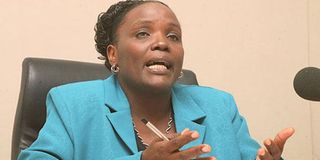Firms lose billions after textbooks ban

Education minister Joyce Ndalichako
What you need to know:
The Ministry of Education, Science Technology and Vocational Training announced a change in policy earlier this year. Prime Minister Kassim Majaliwa reiterated the decision last week, saying the multiplicity of publishers was to blame for many errors found in school textbooks.
Dar es Salaam. Publishers say they have suffered losses running into billion of shillings following the government’s decision to ban private firms from publishing school textbooks.
The Ministry of Education, Science Technology and Vocational Training announced a change in policy earlier this year. Prime Minister Kassim Majaliwa reiterated the decision last week, saying the multiplicity of publishers was to blame for many errors found in school textbooks.
But publishers have criticised the decision as “abrupt”, saying they had not been given a grace period to sell their inventories after 25 years of publishing textbooks for primary and secondary schools.
The magnitude of losses varies from one publisher to another with one reporting a Sh5 billion loss after failing to secure a market for books piled up in warehouses.
The total loss could be higher if all investments made in intellectual rights are factored in.
Many publishers have reportedly failed to service loans they took from financial institutions to expand their services.
The Citizen understands that publishers, who held their annual general meeting yesterday, are frantically engaging the government to find ways of working with the Tanzania Institute of Education (TIE) in textbook publishing. TIE is now responsible for publishing school textbooks.
The newly elected chairman of the Publishers Association of Tanzania (Pata), Mr Gabriel Kitua, told The Citizen that the association was still engaging the government to see if its members could continue to publish reference books, leaving the task of textbooks to TIE.
Pata will soon conduct a survey to establish exact total loss suffered by its members.
Many of the publishers were reluctant to speak openly on the issue, fearing derailing ongoing negotiations with the government.
Those who spoke to The Citizen anonymously, however, said some international organisations had also cancelled tenders they had given private publishers, citing “unpredictability” on the government’s part.
“International agencies such as the United Nations Children’s Fund (Unicef) and Care International have stopped working with us, saying the government’s decisions are unpredictable,” one publisher said.
Booksellers are also complaining of hard times.
Mathew Bookstore director Mwaipyana Albert said he is stuck with a huge quantity of unsold books.
“I have textbooks in my warehouse worth millions of shillings. I know of many other booksellers in Kariakoo and other areas in the country that have had to lay off staff after failing to pay them salaries,” he said.
The government’s decision to sideline private publishers is said to have its basis in Circular number 4 of 2014 that annulled the 1991 government policy on textbook publication that had given private publishers the right to publish books for use in schools across the country.
The circular, dated August 7, 2014, was based on Section 54 of the Education Act that made TIE the county’s sole author, verifier and publisher of textbooks for pre, primary and secondary schools and teachers training colleges.
One of the reasons cited was too many errors found in books. But publishers said the Ministry of Education also bore responsibility for the errors because it is the ministry’s Education Material Approval Committee (Emac) that supervised and controlled the quality of textbooks in the country.
“The director of education in the ministry chairs the textbooks accreditation body that has the duty of ensuring textbooks are of the required quality…they are to blame if accredited books are of poor quality,” one of the publishers who asked for anonymity said.
The issue of poor quality textbooks last month prompted the Minister of Education, Science, Technology and Vocational Training, Prof Joyce Ndalichako, to order the destruction of 2.8 million textbooks for Standard One and Two pupils in Mbeya Region.
Without specifying the mistakes in the books, Prof Ndalichako said the publisher had been ordered to reproduce correct versions of the books at its own cost.
But publishers have demanded that Prof Ndalichako disclose name of errant publisher and take appropriate action.




